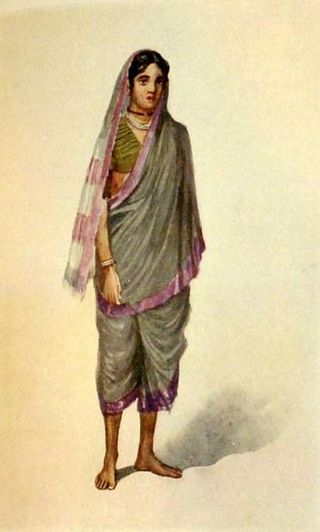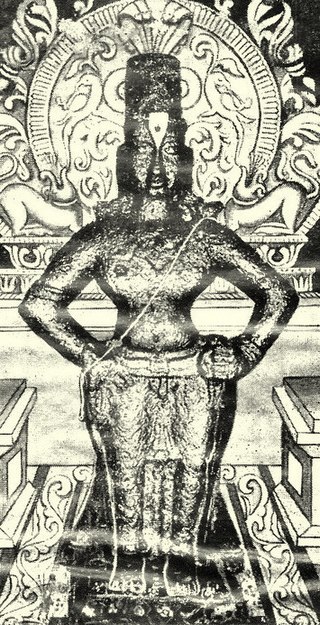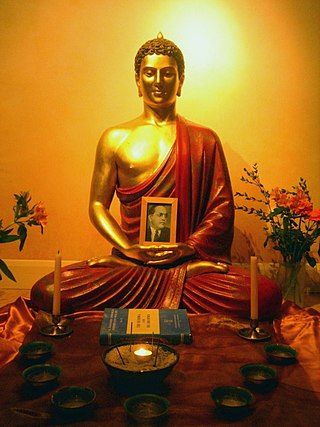Related Research Articles

The Dalit Buddhist movement is a religious as well as a socio-political movement among Dalits in India which was started by B. R. Ambedkar. It re-interpreted Buddhism and created a new school of Buddhism called Navayana. The movement has sought to be a socially and politically engaged form of Buddhism.

Jyotirao Govindrao Phule, also known as Jyotiba Phule, was an Indian social activist, businessman, anti-caste social reformer and writer from Maharashtra.

Sant Tukaram Maharaj, also known as Tuka, Tukobaraya, Tukoba, was a Hindu, Marathi Saint of Varkari sampradaya" in Dehu village, Maharashtra in the 17th century. He was a bhakt of the god Vithoba of Pandharpur. He is best known for his devotional poetry called Abhanga, which are popular in Maharashtra, many of his poems deal with social reform.

Mahar is an Indian caste found largely in the state of Maharashtra and neighbouring areas. Most of the Mahar community followed B. R. Ambedkar in converting to Buddhist in the middle of the 20th century. As of 2017 the Mahar caste was designated as a Scheduled Caste in 16 Indian states.

Namdev, also transliterated as Nam Dayv, Namdeo, Namadeva, was a Marathi Vaishnava saint from Narsi, Hingoli, Maharashtra, Medieval India within the Varkari tradition of Hinduism. He was as a devotee of the deity Vithoba of Pandharpur.

Warkari is a sampradaya within the bhakti spiritual tradition of Hinduism, geographically associated with the Indian state of Maharashtra. Warkaris worship Vitthal, the presiding deity of Pandharpur, regarded as a form of Vishnu. Saints and gurus of the bhakti movement associated with the Warkaris include Dnyaneshwar, Namdev, Chokhamela, Eknath, and Tukaram all of whom are accorded the title of Sant. Recent research has suggested that the Varkaris were historically the followers of Krishna. Vittala is also another name for Krishna. Krishna is referenced as Vittala in most Bhakthi songs of Purandara Dasa and other Bhakti Saints.

Vithoba, also known as Vitthala, and Panduranga, is a Hindu deity predominantly worshipped in the Indian state of Maharashtra and Karnataka. He is a form of the Hindu deity Vishnu in his avatar: Krishna. Vithoba is often depicted as a dark young boy, standing arms akimbo on a brick, sometimes accompanied by his consort Rakhumai.

Chokhamela was a saint from Maharashtra, India in the 13th–14th century. He belonged to the Mahar caste, which was considered that time one of the low castes in India. He was born at Mehuna Raja, a village in Deulgaon Raja Taluka of Buldhana district. He lived at Mangalvedha in Maharashtra. He wrote many Abhangas. One of his known Abhangas is 'Abir Gulal Udhlit Rang". Social activist Arvind Prabhakar Kayande Started Celebrating "Chokhamela Festival" in Deulgaon Raja. He was one of the first low-caste poets in India.
Sant Janābāi was a Marāthi religious Sant and poet in the Hindu tradition in India, who was born likely in the seventh or the eighth decade of the 13th century. She died in 1350.

Sena Nhavi, also known as Saint Sena, and Sena, is a Hindu saint-poet (sant-kavi) of the Varkari sect dedicated to the god Vithoba.

Navayāna, otherwise known as Navayāna Buddhism, refers to the socially engaged form of Buddhism founded and developed by the Indian jurist, social reformer, and scholar B. R. Ambedkar; it is otherwise called Neo-Buddhism and Ambedkarite Buddhism It is not any new sect, it is rather application of Buddhist principles for the welfare of many.

The Vithoba Temple, officially known as Shri Vitthal-Rukmini Mandir, is a Hindu temple in Pandharpur, in the Indian state of Maharashtra. It is the main centre of worship for Vithoba, a form of the god Vishnu or Krishna, and his consort Rakhumai. It is one of the 108 Abhimana Kshethram of Vaishnavate tradition. The temple was built by King Vishnuvardhana of Hoysala Empire between 1108 and 1152 CE upon being convinced by the historical figure Pundalik. Also, there is an inscription in the temple, of a Hoysala King Vira Someshwara dating back to 1237 CE, which grants the temple a village for its upkeep. It is the most visited temple in Maharashtra. The Warkaris start marching from their homes to the temple of Pandharpur in groups called Dindi (procession) to reach on Aashadhi Ekadashi and Kartiki Ekadashi. A dip in the holy river Chandrabhaga, on whose banks Pandharpur resides, is believed to have power to wash all sins. All the devotees are allowed to touch the feet of the idol of Vithoba. In May 2014, the temple became the first in India to invite women and people from backward classes as priests.

Kanhopatra was a 15th-century Marathi saint-poet, venerated by the Varkari sect of Hinduism.
Dalit literature is a genre of Indian writing that focuses on the lives, experiences, and struggles of the Dalit community over centuries, in relation to caste-based oppression and systemic discrimination. This literary genre encompasses various Indian languages such as Marathi, Bangla, Hindi, Kannada, Punjabi, Sindhi, Odia and Tamil and includes narrative-styles like poems, short stories, and autobiographies. The movement started gaining influence during the mid-twentieth-century in independent India and has since spread across various Indian languages.
Sant Nirmala was a 14th-century poet from Maharashtra, India. As the younger sister of Chokhamela, she was deemed equally holy with her brother and thus is also deemed a Hindu saint. Nirmala was married to Banka, of the Mahar caste. Her writings consist largely of abhangs that describe the injustice and inequalities she suffered as a result of the caste system.
Sant Banka In most of his abhangs he praised Vitthal in happiness and peace. Infrequently, he described his lower caste birth.
Soyarabai was a saint from the Mahar caste in 14th-century Maharashtra, India. She was a disciple of her husband, Chokhamela.

Eleanor Zelliot was an American writer, professor of Carleton College and specialist on the India, Southeast Asia, Vietnam, women of Asia, Untouchables, and social movements.
Religion in Maharashtra is characterised by the diversity of religious beliefs and practices.

Marathi Buddhists are Buddhists of Marathi ethnic and linguistic identity. The religious community resides in the Indian state of Maharashtra. They speak Marathi as their mother-tongue. The Marathi Buddhist community is the largest Buddhist community in India. According to the 2011 Indian census, Marathi Buddhists constitute 5.81% of the population in Maharashtra, which is 77% of the total Buddhist population in India.
References
- ↑ Zelliot, Eleanor (2008). "Chokhamela, His Family and the Marathi Tradition". In Aktor, Mikael; Deliège, Robert (eds.). From Stigma to Assertion: Untouchability, Identity and Politics in Early and Modern India. Copenhagen: Museum Tusculanum Press. pp. 76–86. ISBN 978-8763507752.
- ↑ King, Anna S. (2005). "Introduction". In King, Anna S.; Brockington, John L. (eds.). The Intimate Other: Love Divine in Indic Religions. New Delhi: Orient Longman. p. 5. ISBN 8125028013.
- ↑ Zelliot, Eleanor (2000). "Sant Sahitya and its Effect on Dalit Movements". In Kosambi, Meera (ed.). Intersections: Socio-cultural Trends in Maharashtra. New Delhi: Orient Longman. pp. 187–192. ISBN 8125018786.